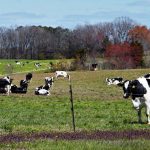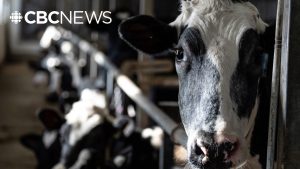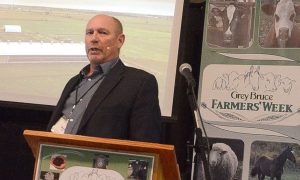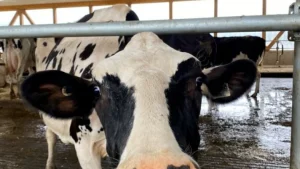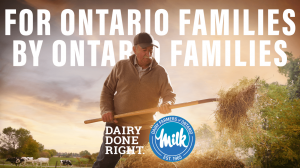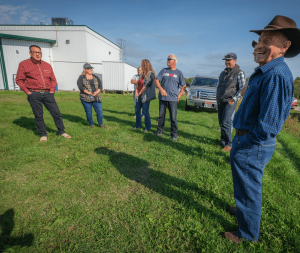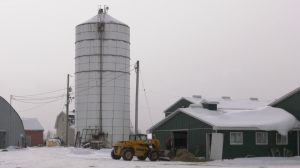
When a Chinese dairy processor invested $332 million to build a baby formula plant in Kingston, Ont., it promised to create hundreds of jobs in Eastern Ontario.
Now, some of the people who took those jobs at Feihe International’s Canadian subsidiary are warning the workplace isn’t safe — and they’re afraid someone is going to get killed.
“They didn’t care about you. They didn’t care about your family,” one worker said. “We were told constantly, ‘This is the way they do things in China.’
“So I kept asking them, ‘Why did you build a factory in Canada, then?'”
“People would ask me where I work and I’d say [Canada Royal Milk], and they’re like, ‘Oh, we’ve heard of that place, we’ve heard the horror stories,'” another worker said. “And I just shake my head … They’re true.”
These two are among five current or former employees who have shared their experiences with CBC News. CBC has agreed to protect their identities because they fear reprisals for speaking out.
Records obtained under Ontario’s freedom of information law document a range of workplace concerns linked to the Kingston plant that have been raised with municipal and provincial officials over the last two years — including explosion and electrocution risks, unsafe storage of chemicals and air quality concerns.
Ontario workplace safety statistics also point to a high rate of injuries at the plant.
When its investment was announced in 2016, Feihe International said it planned to use Canadian cow and goat milk to manufacture tens of thousands of tonnes of powdered products annually, with about 85 per cent of it earmarked for export to China.
The general manager of the Kingston plant and other senior executives were brought over from the Chinese parent company. Other members of the management team were hired in Canada. The plant’s workforce is diverse.
Governments supported new plant
The Canadian facility, incorporated in Canada under the name Canada Royal Milk, was built with the largest foreign investment Ontario’s agri-food sector had ever seen.
All three levels of government put taxpayer resources behind the project, arguing it would stimulate Eastern Ontario’s economy.
We had no confidence at all in the machinery …
– Canada Royal Milk employee
To date, the government of Ontario has provided $13.8 million to Canada Royal Milk through its jobs and prosperity fund for the food and beverage sector, with the balance of its $24 million investment expected to be paid between now and 2024.
But Danie Cousineau, the corporate secretary and manager of the Canadian Dairy Commission, refused to disclose how much federal funding was approved for Canada Royal Milk under its matching investment fund — arguing that such third-party information is subject to Access to Information Act rules.
The city of Kingston transferred 16 hectares of industrial land to the company to build the plant.
When a Chinese dairy processor invested $332 million to build a baby formula plant in Kingston, Ont., it promised to create hundreds of jobs in Eastern Ontario.
Now, some of the people who took those jobs at Feihe International’s Canadian subsidiary are warning the workplace isn’t safe — and they’re afraid someone is going to get killed.
“They didn’t care about you. They didn’t care about your family,” one worker said. “We were told constantly, ‘This is the way they do things in China.’
“So I kept asking them, ‘Why did you build a factory in Canada, then?'”
“People would ask me where I work and I’d say [Canada Royal Milk], and they’re like, ‘Oh, we’ve heard of that place, we’ve heard the horror stories,'” another worker said. “And I just shake my head … They’re true.”
These two are among five current or former employees who have shared their experiences with CBC News. CBC has agreed to protect their identities because they fear reprisals for speaking out.
Records obtained under Ontario’s freedom of information law document a range of workplace concerns linked to the Kingston plant that have been raised with municipal and provincial officials over the last two years — including explosion and electrocution risks, unsafe storage of chemicals and air quality concerns.
Ontario workplace safety statistics also point to a high rate of injuries at the plant.
Workers told CBC News that they were enthusiastic about the project at first. One spoke of feeling “set for life.” Although the pay wasn’t high, workers thought that would change once operations became profitable.
But as production ramped up, the plant struggled with equipment malfunctions and organizational confusion.
One worker said it was “total chaos, sometimes.”
“We had no confidence at all in the machinery,” he said.
WATCH / Current and former employees speak about experiences working at Canada Royal Milk:
Current and former employees of the Canada Royal Milk baby formula production plant in Ontario, which was much-touted by all levels of government when it arrived, say the workplace isn’t safe and they’re worried someone could die. 5:17
When, for example, Ontario regulations required workers to follow a certain process for milk pasteurization and something went wrong, he said, workers were told by supervisors to simply skip that process.
Earlier this month, a dumping incident at the plant’s wastewater treatment facility smelled so foul it alarmed local residents.
Injuries above average
The issues went beyond equipment malfunctions and wasted milk. People got hurt.
The most recent data available from Ontario’s Workplace Safety and Insurance Board (WSIB) are for 2019, the plant’s first year of operations. In those early months, Canada Royal Milk employees missed work due to injuries or illnesses at a rate four times higher than rates recorded by employees at other Ontario food manufacturers with similar workplaces.
The company reported five injuries in 2019 that required treatment beyond standard first aid, that caused an employee to miss work or that caused modifications to an employee’s workplace responsibilities. The publicly available reporting shows injury claims at the Kingston plant included chemical burns, exposure to caustic, noxious or allergenic materials and at least one facial injury.
Late in 2020, Canada Royal Milk joined a WSIB program designed to help employers improve their workplace health and safety.
One worker spoke of how employees worked at high elevations within the plant without training or safety harnesses, sometimes while carrying heavy equipment. A fall from the curved and sometimes slippery roof of a milk truck during a winter delivery, for example, could mean a 12-foot drop onto concrete, he said.
WATCH / Workers discussion conditions at Canada Royal Milk plant:
Five current or former employees of Canada Royal Milk in Kingston, Ont. have shared their experiences with CBC News. Their identities are being protected because they fear reprisals in the community for speaking out. This man describes his experience with Canada Royal Milk. 1:41
“Nobody questioned it, right? Even I didn’t question it at first.”
The worker said he was not confident that workplace incidents were being tracked and reported properly. When a workplace incident happened, he said, staff were told to generate only handwritten reports for the human resources department.
“It was just getting tossed out or getting forgotten about or sitting in a pile on the desk somewhere,” he said. “So people stopped reporting it, basically.”
Reports of unlicensed electrical work
As construction on the plant was wrapping up in January 2020, a complaint was filed with the Ontario Ministry of Labour, Training and Skills Development’s occupational health and safety office alleging unqualified millwrights replaced a heater on a 460-volt live wire without protective equipment.
“They could have killed themselves quite easily,” one worker said. “There [were] lots of instances, mostly with the [foreign] Chinese contractors, working on 600 volts live every day, all day.
“It’s a federally mandated rule. You are not allowed to work live. It takes less than an amp to stop your heart.”
The worker said he tried to warn contractors brought in from China that they were putting their safety at risk, but struggled to get the message across because they didn’t understand English. The plant’s safety manager, he said, rarely left his office.
The worker said that dried milk powder dust — which is combustible — was commonly found floating in the air in parts of the plant; he feared it could ignite with a spark or stray arc from faulty electrical work.
The worker also said some electrical panels weren’t sufficiently rated for use around equipment that is hosed down for cleaning.
Employees also reported fire exits being locked or secured with an electronic key pass system, which could make it hard to get out quickly in an emergency.
Explosion fears
Employees said they’re particularly worried about the plant’s cyclone-style milk dryers; one compared the machines to a “four-storey pressure cooker.” The dryers spin milk with gusts of hot air in their massive steel cylinders until it turns to powder.
Last August, a call was placed to the Ontario labour ministry. A record obtained by CBC News says the caller, name “unknown,” warned that “the milk dryer is going to explode.”
The caller said that, earlier in the summer, the fire suppression system for the dryers failed, leaving 15 centimetres of water all over the floor — but the company continued to operate its dryers without its safety system. The caller said one became clogged with burnt milk product but did not shut down, and a fire subsequently broke out inside the pressurized dryer.
The caller said that when the provincial inspector came, management chose the individuals who spoke to the government representative. The caller was convinced those chosen to speak were “lying” in order to cover things up.
The labour ministry inspector’s report shows the incident was reviewed with company representatives but no orders were required.
“Workers are reminded that the employer need not always agree with their suggestions but that they should always consider them,” the case report concluded. It also said the caller should have left a number for the inspector, as “sometimes this results in no visit required or the worker having more information to go back to the employer with.”
The labour ministry … they’re useless in every sense of the word.
– Canada Royal Milk employee
According to the inspector’s report, Canada Royal Milk told the labour ministry “the fire department had been in to approve the installation of the fire systems in the workplace.”
When CBC News tried to confirm this with Kingston’s fire department, it was told fire prevention officials were not required to approve the separate fire suppression system for the plant’s dryers because this additional system was “voluntary,” in addition to its explosion vents.
Kingston fire inspector Richard Vasko also said that, apart from two false alarms during the plant’s construction phase, there have been no fire code inspections at the plant.
In an email obtained by CBC News, William Sands, a captain with Kingston Fire & Rescue, described how his crew responded to an alarm at the plant a year ago but found itself unable to properly investigate.
“The [plant] workers reset the alarm prior to [fire department] arrival. They have been told before not to do this,” Sands wrote.
“Next time they do this, am I expected to march my crew through one of the biggest industrial facilities in Kingston to make sure everything is OK? I hope not, because it’s not going to happen.”
An employee familiar with the dryer’s alarm system told CBC News he believes it’s not up to industry standards — such as the National Fire Protection Association requirement that alarm circuits be supervised so that, if someone tampers with them, the fire department is alerted.
The worker said he’s “zero per cent” comfortable that it’s safe to operate the dryer.
Air quality concerns
Several employees told CBC News that on one occasion, when the dryer became seriously clogged, outside workers were sent deep into the confined space after regular business hours to chisel out the burnt milk without proper equipment.
Provincial inspection reports show an anonymous complaint was filed about this incident in early August. After talking to the company, the inspector’s report said it was unknown whether the dryer met the definition of a confined space where oxygen levels could be depleted. The inspector requested more information.
He also reported noticing a small pipe sticking out of the floor on that visit and issued an order about the tripping hazard.
Last June, an anonymous caller contacted the provincial labour ministry to report that Canada Royal Milk was turning off its ventilation system to save money, resulting in very hot and humid conditions and a lack of fresh air on the production floor. In this instance, the inspector wrote his report without checking anything in person — the record indicates “phone and electronic contact only.”
It was at least the second time air quality had been raised with the ministry. A labour ministry report last spring noted the “high level of particulate matter in the air” in the ingredients room, and the need for workers to wear respirators. That too was investigated with “phone contact only.”
Employees said they struggled to get the respirators the ministry agreed they needed. The files obtained by CBC News include handwritten notes from an inspector in late March that show the ministry was aware of an “employee with pneumonia.”
“The labour ministry … they’re useless in every sense of the word,” one employee said.
“You see them come, you see them talk to the management and then everything calms down for a week or so, maybe longer. And then it happens again,” another worker said. “What the hell, man? Like, didn’t you just get talked to?”
CBC News asked the Ontario Ministry of Labour, Training and Skills Development a series of questions about how inspectors handle anonymous tips, its policy on when site visits are required and whether the pandemic affected inspections over the past year.
In a statement, ministry spokesperson Kalem McSween said inspectors conduct in-person investigations “whenever it is necessary to do so.” The law requires employers to allow inspectors access to any areas the inspector deems necessary, he said.
“Where anonymity has been requested and where reprisal against the complainant is a concern, the inspector will investigate the nature of the complaint and address any hazards/contraventions that come to the inspector’s attention,” he said.
Health and safety company’s ‘top priority’
Employees also allege chemicals were not used and stored safely at the Kingston plant.
Pickling paste — a potentially harmful acid product used for cleaning stainless steel welds — was sitting around unlabelled in water bottles, workers told CBC News. Workers recall two people being taken to the hospital after coming into contact with the acid without adequate protection.
Concerns raised with the labour ministry in April cited a lack of “SDS [safety data sheet] information” for chemicals around the plant. After an inspection conducted over the phone, a provincial government inspector reported the SDS information was available in nine locations around the plant.
Here I am with an employer that doesn’t seem to give a damn about my health and safety … so what am I left to do?
– Canada Royal Milk employee
CBC has obtained photos and videos of a chemical storage area in a corridor that employees were told was illegal because it lacked things like a proper drain, ventilation and a fire suppression system.
When the company was notified an inspector was coming, employees said, the chemicals were moved from that storage area to avoid detection.
Records obtained from the fire department show that a caller who would not identify himself phoned the City of Kingston in late June to report “bulk chemical storage.” The handwritten notes say the caller described the precise location in the building, listing off what was stored there and the types of containers used.
It’s not clear what happened after this call. Subsequent fire inspector notes mention “no chemicals” and an emptied room, but the context is unclear because sections of the documents are blacked-out.
Canada Royal Milk declined an interview request from CBC News. In a statement, the company said that its operations had been “delayed and impacted by the global pandemic, but the health and safety of our employees continues to be our top priority.”
“In every aspect of our business, whenever concerns are raised, we readily cooperate with the appropriate authorities and regulatory bodies to ensure that they are investigated in a transparent manner, addressed and resolved,” the statement continued.
“As a very proud local employer and member of the Kingston community, we have worked closely with the Ontario Ministry of Labour to ensure our facilities, training and equipment are up to their standards and continue to make additional improvements, following our own best practices, and based on employee feedback.”
Worker felt ‘helpless’
Workers who knew something was unsafe because of their experiences on other job sites in Canada said they struggled to communicate those risks to other employees who had limited or no English skills.
“There was only one translator, and he was always up in the office,” one said.
Another worker said that many of the plant’s recent hires have been young and “right out of college,” with “no concept” of what’s legal because they’ve never worked in Canada before.
Despite the ongoing COVID-19 pandemic, some former plant workers have now found other jobs. They said they’re speaking out in support of their former colleagues and others who may work there in the future.
One said workers are depressed because they don’t know what else to do. Some are stressed to the point of taking anxiety medication.
“It was not a healthy environment for anybody, whatsoever,” a worker told CBC News. “But around this area, there’s not a lot of work and a lot of them got families and a lot of them got kids.”
“It made me feel very helpless,” another said. “Here I am with an employer that doesn’t seem to give a damn about my health and safety … so what am I left to do?
“For the sake of a paycheque and not telling my youngest kid his brand new bedroom is in the woods, I keep going.”

